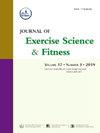The relationship between 24-h Movement Behaviors and executive function in children aged 3–6 years: The mediating and moderating roles of fundamental movement skills
IF 2.4
2区 医学
Q2 SPORT SCIENCES
引用次数: 0
Abstract
Objective
This study seeks to explore the role of children's fundamental movement skills(FMS) within the framework of 24-h Movement Behaviors and executive function(EF)through the application of structural equation modeling (SEM).
Methods
The study employs a cross-sectional design. Apart from sleep data, which was collected via questionnaires, all other data were objectively measured using ActiGraph wGT3-BT accelerometers. EF was assessed using N-Back and Flanker tasks, while FMS was evaluated using the third edition of the test of gross motor development (TGMD-3). Both the isometric log-ratio (ILR) transformation and SEM were conducted using RStudio software.
Results
Overall, 24-h Movement Behaviors predicted children's inhibitory control(IC) reaction time (P = 0.018). FMS significantly predicted both IC and working memory (WM) (P = 0.001). However, the direct impact of 24-h Movement Behaviors on FMS was not significant (P > 0.050). The interaction between FMS and overall, 24-h Movement Behaviors, along with their observed variables significantly promoted the positive development of children's EF (P < 0.050).
Conclusion
Within the 24-h Movement Behaviors framework, FMS did not exhibit its previously established mediating role. However, the interaction between FMS and 24-h Movement Behaviors positively promoted the development of children's EF. This suggests that FMS plays an important regulatory role in the relationship between 24-h Movement Behaviors and EF, which is significant for the overall development of children.
3 ~ 6岁儿童24小时运动行为与执行功能的关系:基本运动技能的中介和调节作用
目的应用结构方程模型(SEM)探讨儿童基本运动技能(FMS)在24小时运动行为与执行功能(EF)框架中的作用。方法本研究采用横断面设计。除睡眠数据通过问卷收集外,所有其他数据均使用ActiGraph wGT3-BT加速计客观测量。EF使用N-Back和Flanker任务进行评估,FMS使用第三版大肌肉运动发展测试(TGMD-3)进行评估。采用RStudio软件进行等距对数比(ILR)变换和扫描电镜分析。结果总体而言,24小时运动行为预测儿童抑制控制反应时间(P = 0.018)。FMS对IC和工作记忆(WM)均有显著预测(P = 0.001)。然而,24小时运动行为对FMS的直接影响不显著(P >;0.050)。FMS与整体24小时运动行为及其观察变量之间的交互作用显著促进了儿童EF的正向发展(P <;0.050)。结论在24小时运动行为框架内,FMS并没有表现出先前确定的中介作用。而FMS与24小时运动行为的交互作用对儿童EF的发展有积极的促进作用。这表明FMS在24小时运动行为与EF的关系中起着重要的调节作用,这对儿童的全面发展具有重要意义。
本文章由计算机程序翻译,如有差异,请以英文原文为准。
求助全文
约1分钟内获得全文
求助全文
来源期刊
CiteScore
5.10
自引率
3.60%
发文量
54
审稿时长
31 days
期刊介绍:
The Journal of Exercise Science and Fitness is the official peer-reviewed journal of The Society of Chinese Scholars on Exercise Physiology and Fitness (SCSEPF), the Physical Fitness Association of Hong Kong, China (HKPFA), and the Hong Kong Association of Sports Medicine and Sports Science (HKASMSS). It is published twice a year, in June and December, by Elsevier.
The Journal accepts original investigations, comprehensive reviews, case studies and short communications on current topics in exercise science, physical fitness and physical education.

 求助内容:
求助内容: 应助结果提醒方式:
应助结果提醒方式:


